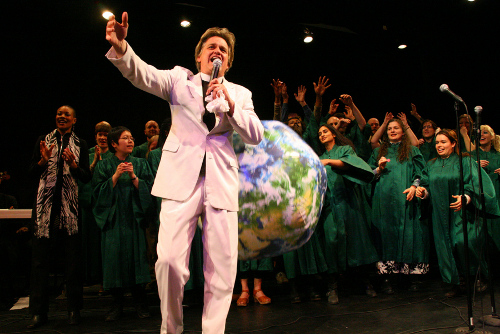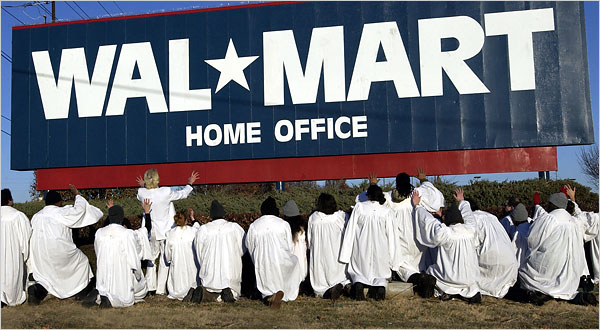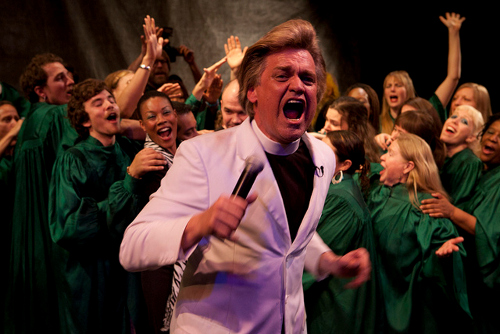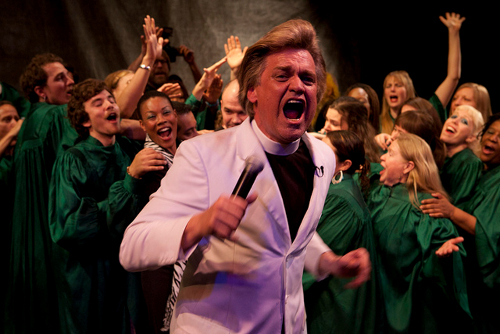 The Reverend wants you to believe the Earth can be saved! Amen.Photo: Brennan CavanaughThe Reverend preaches: “It’s not easy for Americans to slow down their consumption. No, it ain’t! We’ve got to help each other out. Give each other the power. Yes we do! To back away from the product. To turn. To escape the big box. The hypnosis of corporate greed! Amen, hallelujah.“
The Reverend wants you to believe the Earth can be saved! Amen.Photo: Brennan CavanaughThe Reverend preaches: “It’s not easy for Americans to slow down their consumption. No, it ain’t! We’ve got to help each other out. Give each other the power. Yes we do! To back away from the product. To turn. To escape the big box. The hypnosis of corporate greed! Amen, hallelujah.“
And the choir sings: “Eartha-lu, Eartha-lu, Eartha-lu-jah! Eartha-lu, Eartha-lu, Eartha-lu-jah!”
“This force is inside each of us,” the Reverend continues. “It’s in the air. It’s coming through the floorboards. Earthalujah. Yeah, yes, amen. Give us the power today to. Stop! Shopping!”
This is Sunday evening in Reverend Billy Talen’s Church of Earthalujah, a “neo-pagan gospel experiment,” a “radical Earth worship show” that’s developed from the performance artist’s anti-consumerism crusade known as the Church of Life After Shopping. Adopting the persona of an evangelical preacher, and surrounded by a lively green-robed choir 35 voices strong, Reverend Billy blends religion, comedy, music, and politics every week at Theatre 80 in New York City’s East Village.
After her first visit on a recent Sunday, Linda Novenski, a childcare provider in her 60s, was inspired to action. “When I went to the performance-slash-service, it just connected with everything I’ve been focused on for so long,” she said. “It’s like finding a home, a like-minded bunch of people.”
At the close of the show, Novenski joined more than 100 others on stage, nearly everyone in the audience, in response to the Reverend’s call to accept the ever-expanding beliefs of the Church of Earthalujah. But the majority of the crowd, a mostly white group ranging from young Williamsburg hipster to older Village hippie, seemed to already subscribe to some form of environmentalism, if not to Reverend Billy’s. A few tourists stayed in their seats to capture the moment, getting the most out of the $10 they paid at the door.
After a period as a successful theater performer and producer in San Francisco, Talen, who was raised Dutch Calvinist in the Midwest, began his Reverend Billy-centered project in 1999 by denouncing big business from a pulpit in Times Square. Many New Yorkers have since come to recognize his white suit and clerical collar, his pompadour, his megaphone, and, of course, the choir that usually surrounds him. Over the past decade, the church has also gained notoriety outside of the city through international tours, high-profile performances (at Burning Man, for example), albums, books, and a documentary produced by Morgan Spurlock called What Would Jesus Buy? — proceeds from which help keep the project afloat.
Talen and Savitri D, his wife and the church’s director, created the Church of Earthalujah in early 2011, responding to the prioritization of economic woes over environmental concerns in the wake of the recession. It makes the connection between big corporations and environmental degradation of all sorts: mountaintop removal, fracking, clear-cutting, coal pollution. Talen thinks that environmentalists have lost the capacity to “go out into the middle of the village common and shout like a town crier.” He is willing to go there and do that.
Walmart, perhaps the most potent symbol of corporate consumerism, is as central to this new Earthalujah religion as it was to the Church of Life After Shopping, a project the Reverend started in 1999 by denouncing big business from a pulpit in Times Square.
“If you support Walmart, you support climate change,” Talen says. “Nobody puts more people in the world into traffic jams than Walmart. It simply lays down 11 acres of pavement, and it lays down that big box, and that big box is the same as every other big box.”
 Get thee behind me, Walmart.Photo: Fred AskewTo Talen and his followers, the world’s largest retailer is much more than a simple icon of modern capitalism. “They have so much power that they can start to define what organic is, for example,” Savitri says. “They are masters of greenwashing.”
Get thee behind me, Walmart.Photo: Fred AskewTo Talen and his followers, the world’s largest retailer is much more than a simple icon of modern capitalism. “They have so much power that they can start to define what organic is, for example,” Savitri says. “They are masters of greenwashing.”
The duo’s strong stance against Walmart extends beyond general anti-consumerist or pro-environment ideals. With the megastore seriously exploring potential locations in New York City, and putting big money into the campaign for support among sometimes wary residents, the fight has become personal.
“It’s not just an ideological battle,” Savitri says. “We really don’t want Walmart in New York City. We love going to the bodega, we love the patter on the street, we love talking to shop owners. We love the magic creativity of small business in New York City.”
Reverend Billy says the coming of Walmart portends homogenization and death for neighborhoods. He prophesies the destruction of neighborhood economies and the stifling of artistic expression if the chain were to move within the five boroughs.
If the city blocks Walmart, Talen says, the consequences would be equally significant. For New York City is a powerful symbol in its own right. “Things here have an extra power, an extra charge throughout the world,” he says.
The church’s weekly theater performances are well-choreographed events — a communal effort led by Talen and Savitri — that include the sainting of activists (Tim DeChristopher, Barbara Ehrenreich, and The Yes Men among them) along with theatrical preaching and original gospel songs. But Reverend Billy and his Stop Shopping Gospel Choir also take their message to the streets, welcoming individual participation and encouraging community engagement.
The Reverend and his choir aim to reinvent how we imagine, relate to, and conduct ourselves in public space. Partnering with a range of advocacy groups, they organize actions and protests and flashmobs. Wearing angel wings, they storm banks that finance mountaintop removal. They parade through Macy’s on Black Friday (a.k.a. Buy Nothing Day). They stage themed protests — against sexism, sweat shops, low pay — against the Walmarts around New York City in an event dubbed “Ring of Ire.”
“He’s questioning the norm, doing things a little differently,” says Barbara Ross, a cycling advocate with the environmental direct-action group Time’s Up who first met Reverend Billy about a decade ago. “Even though some might see it as ridiculous, it’s also serious. It’s a serious issue. And most people get that.”
Talen’s decidedly campy approach has its hazards. It risks alienating the practical, the religious, and the matter-of-fact. And it also risks casting environmentalists as too exuberant, too clownish, too extreme. But Reverend Billy and his Church of Earthalujah see themselves as adding an urgent and essential voice to the communal cry of environmental activists. As Savitri says, they’re “one tool in a much larger kit.”
Novenski agrees: “I think we need extreme and creative measures to grab people’s attention,” she says. “I felt like my battery was really charged there. This is the closest I’m going to come to a conversion.”
 Photo: Church of EarthalujahReverend Billy willingly assumes this role of performer, of provocateur, of parade leader. He realizes the potential for attracting an audience in a city with such media concentration. But when it comes to speaking out against Walmart moving into New York, he adopts a more solemn tone. Together with community organizations like Jobs With Justice and New York Community Coalition, he visits the abandoned East New York, Brooklyn beach lot the store is eyeing for development. And he preaches, in manner unlike Sunday evenings, to local residents.
Photo: Church of EarthalujahReverend Billy willingly assumes this role of performer, of provocateur, of parade leader. He realizes the potential for attracting an audience in a city with such media concentration. But when it comes to speaking out against Walmart moving into New York, he adopts a more solemn tone. Together with community organizations like Jobs With Justice and New York Community Coalition, he visits the abandoned East New York, Brooklyn beach lot the store is eyeing for development. And he preaches, in manner unlike Sunday evenings, to local residents.
“There is life in this sand, there is life in these dunes,” he says slowly. “But this place has been demoted by years of dumping, by being ignored. It has been demoted until all we can imagine it’s good for is a Walmart.”
Louder now: “And that economy comes in, and you end up unable to walk anywhere, unable to bicycle anywhere, no mass transit. You are forced into automobiles! Forced into cars and trucks!” He pauses.
“The Earth is speaking to us now. Earthalujah.”




